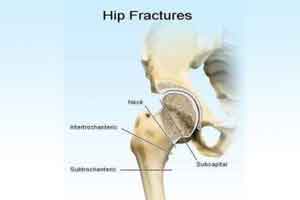- Home
- Editorial
- News
- Practice Guidelines
- Anesthesiology Guidelines
- Cancer Guidelines
- Cardiac Sciences Guidelines
- Critical Care Guidelines
- Dentistry Guidelines
- Dermatology Guidelines
- Diabetes and Endo Guidelines
- Diagnostics Guidelines
- ENT Guidelines
- Featured Practice Guidelines
- Gastroenterology Guidelines
- Geriatrics Guidelines
- Medicine Guidelines
- Nephrology Guidelines
- Neurosciences Guidelines
- Obs and Gynae Guidelines
- Ophthalmology Guidelines
- Orthopaedics Guidelines
- Paediatrics Guidelines
- Psychiatry Guidelines
- Pulmonology Guidelines
- Radiology Guidelines
- Surgery Guidelines
- Urology Guidelines
Delaying surgery in hip fracture beyond one day associated with increased risk of death

Bottom Line: Waiting more than 24 hours to undergo hip fracture surgery may be associated with an increased risk of death and complications.
Why The Research Is Interesting: Disagreements remain about acceptable delay for surgical repair of hip fracture. Guidelines in the U.S. and Canada recommend surgery within 48 hours.
Who and When: 42,230 adults who had hip fracture surgery between April 2009 and March 2014 at 72 hospitals in Ontario, Canada.
What (Study Measures): Time in hours from emergency department arrival until surgery (exposure); death within 30 days of hospital admittance for hip fracture surgery (outcome).
How (Study Design): This is an observational study. Because researchers are not intervening for purposes of the study they cannot control natural differences that could explain study findings. In observational studies, researchers observe exposures and outcomes for patients as they occur naturally in clinical care or real life. Because researchers are not intervening for purposes of the study they cannot control natural differences that could explain study findings so they cannot prove a cause-and-effect relationship.
Authors: Daniel Pincus, M.D., of the University of Toronto, and coauthors
Results: Patients who had surgery for hip fracture after 24 hours had an increased risk of death compared to patients who had surgery within 24 hours (6.5 percent vs 5.8 percent). The risk of complications, such as heart attack, deep vein thrombosis, pulmonary embolism, and pneumonia, were also higher for patients who had surgery after 24 hours.
Study Limitations: Sick patients who may have died awaiting surgery were not included in the study.

Disclaimer: This site is primarily intended for healthcare professionals. Any content/information on this website does not replace the advice of medical and/or health professionals and should not be construed as medical/diagnostic advice/endorsement or prescription. Use of this site is subject to our terms of use, privacy policy, advertisement policy. © 2020 Minerva Medical Treatment Pvt Ltd